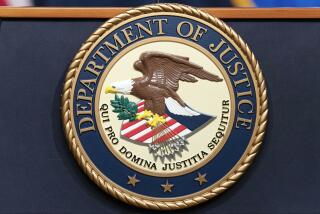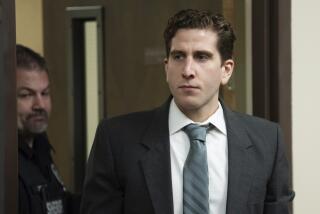Trial begins in Oregon Christmas tree bomb plot
SEATTLE -- The target was busy Pioneer Square in downtown Portland, Ore., when thousands of people gathered for the annual lighting of the Christmas tree. The plan, prosecutors say, was to park a van loaded with explosives and detonate it from a distance.
“You know, the streets are packed,” Mohamed Osman Mohamud, a young Beaverton, Ore., man, told his contact, who went by the name of Youssef, according to a prosecutorial memo. The plan was “for them to be attacked in their own element with their families, celebrating the holidays. And then for later on to be saying, this was for them, for you to refrain from killing our children.”
“You know what I like to see? Is when I see the enemies of Allah … their bodies are torn everywhere. Like, when I see the pictures,” he allegedly continued. Americans, he said, are “the most evil people.”
The bomb never went off. Youssef was not a fellow terrorist, but an undercover operative for the FBI, and the bombs planted in the van were fake. Yet as testimony began Monday in Mohamud’s federal trial in Portland, prosecutors said Mohamud clearly believed he was preparing to kill thousands of people when he dialed a code on a cellphone in November 2010 and waited to hear an explosion.
“[Pray] that I will be a martyr in the highest chambers of paradise,” Mohamud wrote in an email to a friend that was read by FBI agent Miltiadis Trousas from the witness stand, according to the Associated Press. “He’s talking about martyrdom here,” Trousas said.
Mohamud, 21, was “already radicalized and dangerous,” when FBI agents began watching him, Trousas said -- a key point, since defense lawyers argue that Mohamud was entrapped by the government into planning and trying to execute the crime.
“Although Mr. Mohamud had expressed unpopular political ideas and fundamentalist religious beliefs, he was not ready and willing -- had not even contemplated -- using a weapon of mass destruction in the United States against his fellow citizens,” his lawyer, chief federal public defender Stephen R. Sady, argued in his trial memorandum.
“The psychological manipulation of a conflicted teenager the government knew intimately from extensive active surveillance achieved precisely its aim: Agreement and participation to commit a spectacular act that Mr. Mohamud himself neither planned, intended, nor even contemplated prior to the governmental contacts,” Sady wrote.
It will be the government’s responsibility during the next few weeks to prove that Mohamud, a Somali American who attended Beaverton High School near Portland, already had a predisposition to commit an act of violence, or else that the defendant was not induced by government agents to commit the crime.
Prosecutors have laid out substantial evidence that Mohamud had contributed articles to jihadist websites and corresponded with supporters of Al Qaeda abroad talking of his support for jihad and his desire to travel to Yemen to help the cause.
His father interrupted one such plan, notifying the FBI in August 2009 that he feared that his son, whom he described as immature, was in danger of brainwashing by extremists and could fall under their influence if he succeeded in going to Yemen to study Islam.
Mohamud enrolled at Oregon State University in Corvallis as an engineering student that fall, according to court documents. While he appeared to be a normal student without any suspicious leanings, studying, using drugs and alcohol and socializing with friends, government prosecutors assert he was actually “leading a double life,” continuing to adhere to “radical Islamic ideology.”
He wrote to Youssef and another undercover FBI informant who he thought was a Muslim radical: “When I came here I made a different image. … Other people they’re thinking, oh this guy, he gave up his ideas, he’s in college now. … I had to cover you know, stay low. It’s for security.”
He wrote in his diary: “You are: hipster muslim … no signs of extremism.” In another entry, he said: “Whenever you come home, show gangster/party face … do not show extremism.”
FBI agents contend that Mohamud himself told undercover agents he wanted to “become operational” and allegedly talked about placing explosives in a car, parking it near a target and exploding it.
The conversation when he is said to have first brought that up wasn’t recorded, however, allegedly because the recording device ran out of battery power.
A little more than two weeks later, on Aug. 19, 2010, Mohamud again met Youssef and Hussein and told them he’d identified a target: Pioneer Square.
“It’s like the main meeting when they have events, everybody comes up there, you know? So they have a … Christmas lighting and some 25,000 people that attend. You know, the streets are packed. I thought, I thought if you could help me you know to have a, you know a truck … a truck with, you know, explosives,” he said, according to prosecutors.
Sady, though, has portrayed Mohamud as an impressionable young person pushed by the FBI to participate in the plan. Indeed, defense lawyers say, Mohamud, with the help of his parents, had planned to leave Oregon to take a fishing job in Alaska, but was prevented from boarding the plane to start his new life because the FBI had put him on a no-fly list.
Mohamud, defense attorneys said in their memo to the court, “deeply regrets his actions and is humiliated and ashamed for what he said and did.”
But it is a long stretch between expressing unpopular political ideas and fundamentalist religious beliefs and being ready to commit a crime, they argued. Defense attorneys have given notice that they will seek to have the charges dismissed on the basis of illegal entrapment after the government presents its case.
“Government operatives took action to mold and manipulate a confused and conflicted teenager in order to encourage the crime,” the defense said.
ALSO:
George H.W. Bush goes home after two months in hospital
Rahm Emanuel wants Chicago to end investments in gun makers
Sandy Hook group calls for ‘real change,’ but what does that mean?
More to Read
Sign up for Essential California
The most important California stories and recommendations in your inbox every morning.
You may occasionally receive promotional content from the Los Angeles Times.










